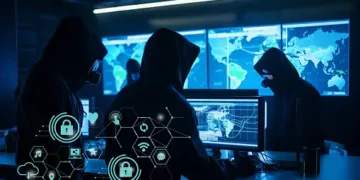The U.S. government is on alert for possible cyber threats that may arise as a result of ongoing tensions in the Middle East. Federal officials have expressed concerns that cyber operatives affiliated with certain regimes may launch attacks not only on regional adversaries but also on nations allied with those adversaries.
There is an awareness among U.S. officials that such cyberattacks could potentially target critical infrastructure systems, like those providing water or electricity, and may include efforts to disseminate disinformation. The use of proxy entities is also a concern, as it could obscure the origins of such cyber activities.
FBI Director Christopher Wray, in a recent Senate Homeland Security and Governmental Affairs Committee hearing, noted an escalation in cyber activities by state and non-state actors from regions of concern, indicating a possible rise in the sophistication and frequency of attacks amid broader geopolitical conflicts.
While there has been no specific intelligence pointing to an imminent attack on U.S. critical infrastructure, federal agencies are on high alert. New defense mechanisms developed after significant international events have prompted agencies to improve readiness for possible threats across multiple fronts.
The United States acknowledges the capability of sophisticated cyber operatives in various countries, including those aligned with Iran, Russia, and China, which possess the technical skills to infiltrate government and corporate networks. Past incidents have shown that these capabilities can lead to significant cybersecurity challenges.
Following recent escalations, the Department of Homeland Security (DHS) conducted briefings with nearly 4,000 law enforcement officials to discuss the cybersecurity implications of the conflict. DHS’s Cybersecurity and Infrastructure Security Agency (CISA), tasked with coordinating the national response to such cyber threats, has reportedly increased its monitoring activities and is in continuous dialogue with international partners.
CISA’s executive director for cybersecurity, Eric Goldstein, affirmed that the agency is actively coordinating with Israeli counterparts in response to the situation. Additionally, CISA is modifying its “Shields Up” initiative, designed to bolster network defenses, to better address new cyber threats, updating their guidance and recommendations for critical infrastructure operators.
Senate Intelligence Chair Mark Warner has called for more proactive measures from CISA to anticipate and counteract potential threats, highlighting the importance of cybersecurity vigilance during times of international tension.
Furthermore, DHS is said to be disseminating threat information to a variety of organizations that could be at risk, including faith-based groups. The Faith-Based Information Sharing and Analysis Organization (FB-ISAO) has elevated its cyber threat level in response to concerns that religious organizations’ online platforms could be compromised.
Iran’s capabilities in cyber warfare have been noted in previous U.S. indictments of Iranian nationals for attempted cyber intrusions and interference in U.S. elections. There is a general understanding among experts that retaliation in cyberspace by Iranian-linked groups could follow if there are cyber operations targeting Iranian interests.
The U.S. government, cybersecurity experts, and lawmakers are treating the potential for Iranian cyber activities with gravity, acknowledging the need for preemptive measures to secure national and allied interests against cyber incursions linked to the Middle East conflicts.
Stay on top of supply chain news with The Supply Chain Report. Enhance your international trade knowledge with free tools from ADAMftd.com.
#CyberThreats #MiddleEastTensions #CriticalInfrastructure #CISA #CyberDefense #DHS #FBI #CyberSecurity #IranCyberThreats #GeopoliticalCyberRisks #ShieldsUp #CyberVigilance #Disinformation #ProxyAttacks #CyberPreparedness #NationalSecurity #FaithBasedSecurity #CyberSecurityAwareness















